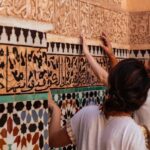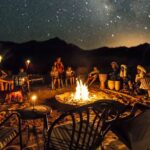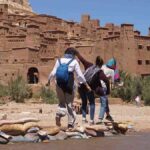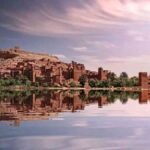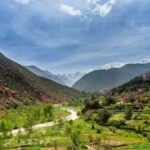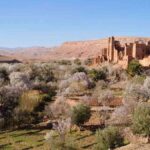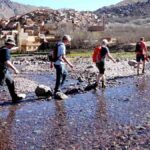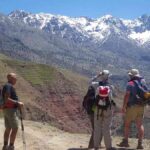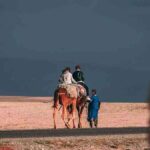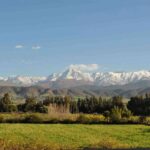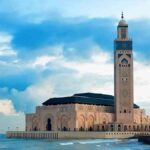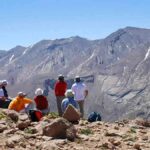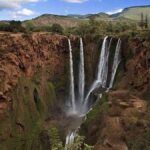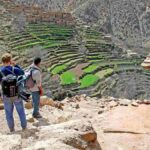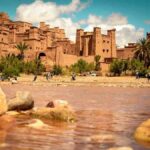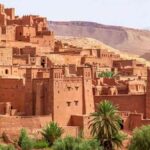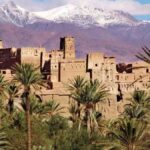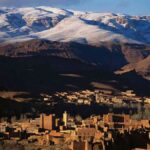Introduction to Todgha Gorges
Nestled in the eastern part of the High Atlas Mountains near the town of Tinghir, Todgha Gorges is one of Morocco’s most awe-inspiring natural wonders. Carved by the powerful Todgha River over centuries, this series of limestone river canyons is famed for its steep cliffs, rising up to 300 meters in some parts. What once was a hidden treasure known mostly to locals and adventurers has now emerged as a must-visit destination for nature lovers, climbers, and cultural travelers alike.
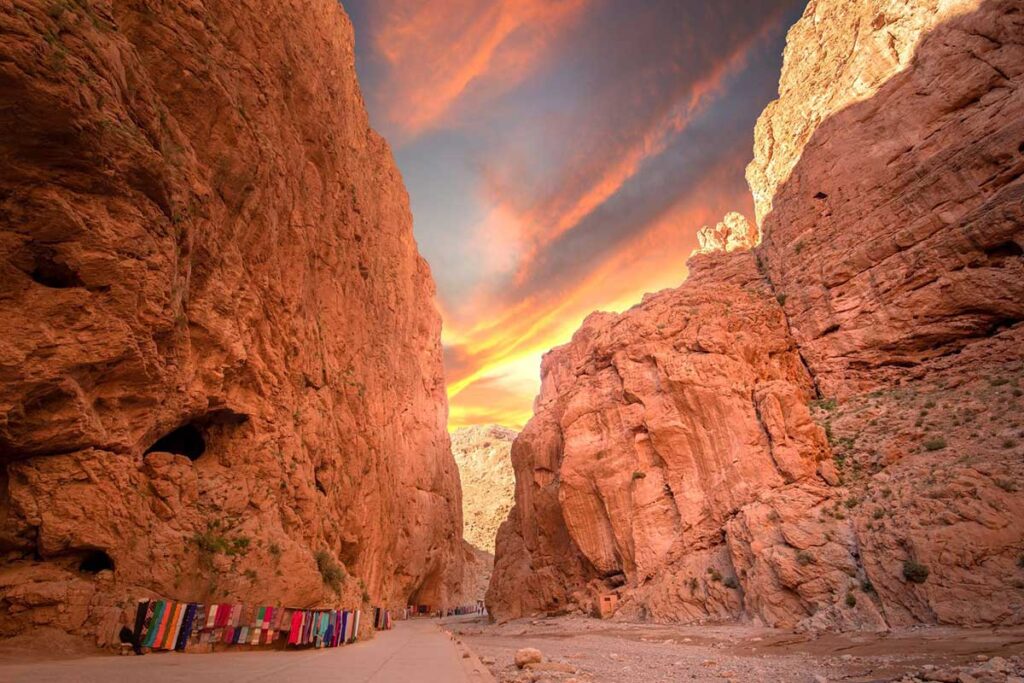
What are Todgha Gorges?
Todgha Gorges, sometimes spelled Todra Gorges, refers to a dramatic gorge that cuts through the eastern side of the High Atlas Mountains. It’s a paradise for rock climbers and hikers, boasting crystal-clear waters flowing through a narrow canyon, surrounded by golden-red rock walls.
Historical and Geological Background
Formed over millennia by the erosion caused by the Todgha River, these gorges showcase the power of nature and time. Layers of sedimentary rock reveal stories of the Earth’s geological history, and the area is often studied for its tectonic and erosional significance.
Location and Accessibility
The gorges are located about 15 kilometers from Tinghir, which lies halfway between Marrakech and Merzouga. Whether you’re coming from the bustling streets of Marrakech or the serene dunes of the Sahara, Todgha Gorges is conveniently situated for a scenic stopover or a dedicated visit.
Geography and Natural Features
Unique Limestone Rock Formations
The towering limestone cliffs of Todgha Gorges are among the most striking features of the region. These walls glow in hues of orange, pink, and gold, particularly at sunrise and sunset, making them a photographer’s dream.
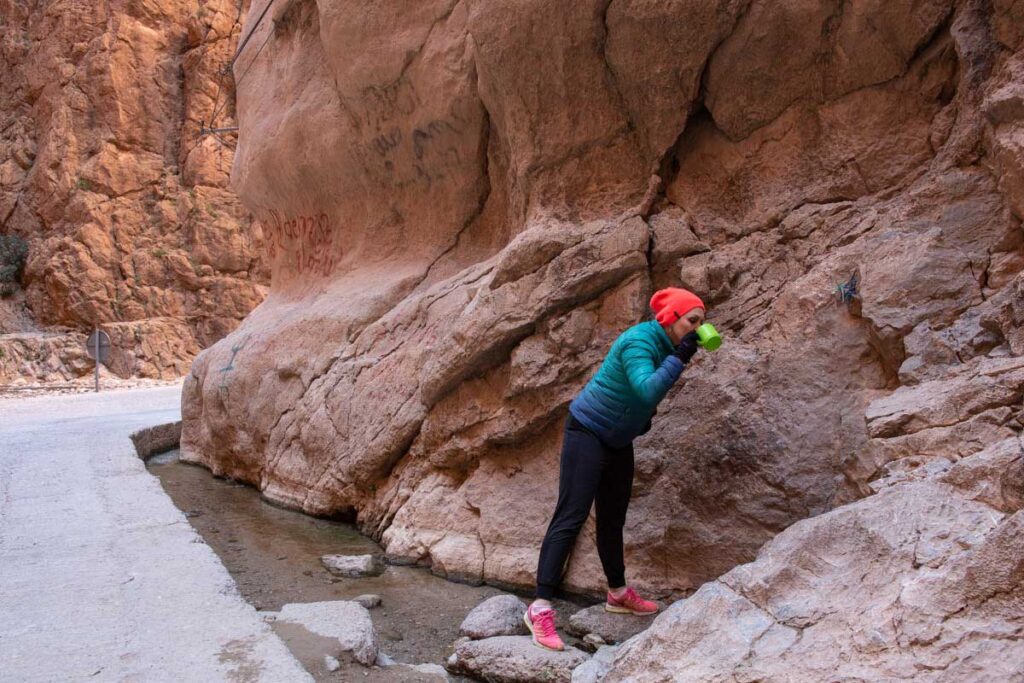
The Todgha River and Canyon Walls
During spring, the Todgha River rushes through the base of the gorge, forming shallow pools and streams perfect for cooling off. In drier months, it reduces to a trickle, revealing polished stones and pathways for hikers to explore the canyon floor.
Flora and Fauna of the Region
While much of the landscape is rocky, the edges of the gorge and surrounding valleys are dotted with palm groves, olive trees, and resilient desert flora. Birdwatchers may spot kestrels, eagles, and other birds of prey soaring between the cliffs.
Cultural Significance
The Berber People and Local Communities
The Todgha Valley is home to Amazigh (Berber tribes) who have lived in harmony with the land for generations. These communities maintain a traditional lifestyle, relying on farming, artisanal crafts, and now, eco-tourism.
Traditional Customs and Hospitality
Visitors are often welcomed with mint tea, a staple of Moroccan hospitality. It’s not uncommon to be invited into a home or small guesthouse to share a meal or learn about local customs.
Importance of the Gorges in Moroccan Culture
Beyond their natural beauty, Todgha Gorges hold a deep cultural meaning as a symbol of resilience and harmony with nature. The area features in Moroccan folklore and oral histories.
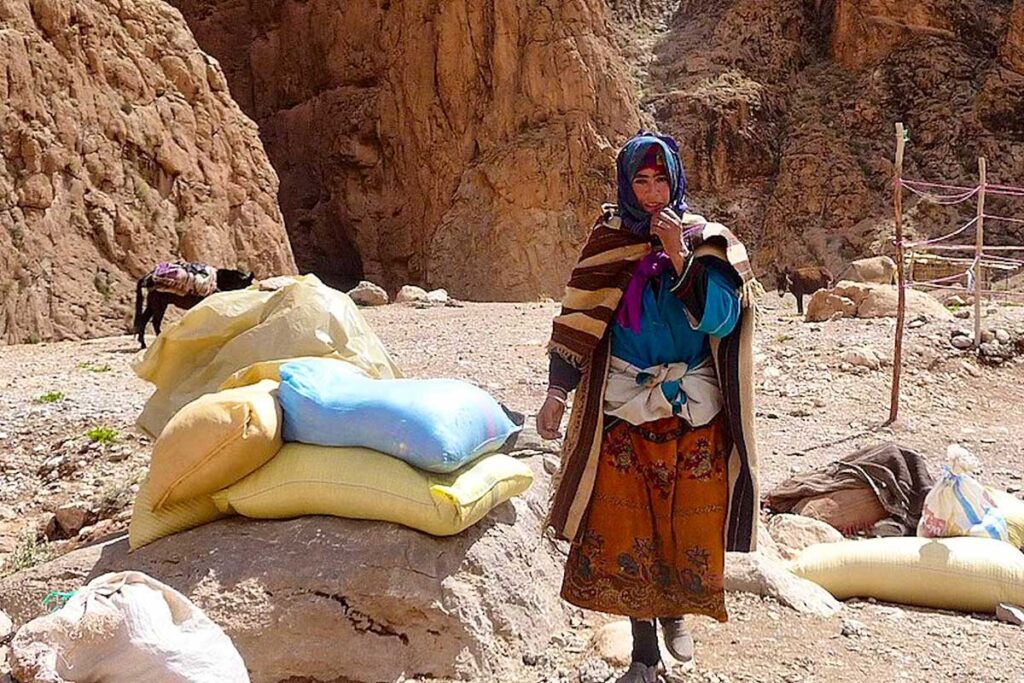
Best Time to Visit Todgha Gorges
Seasonal Highlights and Weather Conditions
Spring (March to May) and autumn (September to November) offer the most pleasant weather. Summer can be extremely hot, especially in the afternoons, while winter nights can be surprisingly cold despite sunny days.
Ideal Months for Outdoor Activities
For hikers and climbers, late spring and early fall provide optimal conditions with cooler temperatures and clear skies.
Getting There: Transportation Options
From Marrakech or Fes to Todgha
From Marrakech, it’s a 6-7 hour drive via the Tizi n’Tichka Pass and the Dades Valley. From Fes, the route via Errachidia and Erfoud is more scenic and desert-laden, taking about 8-9 hours.
Public vs Private Transport Options
Buses and shared taxis run regularly to Tinghir, from where you can take a taxi or hike to the gorges. Private transport offers more comfort and flexibility.
Guided Tours and Local Travel Tips
Many travel agencies in Morocco offer 2-3 day excursions to Todgha Gorges, often combined with stops in the Sahara Desert or Kasbah Ait Ben Haddou.
Top Things to Do in Todgha Gorges
- Hiking and Trekking Adventures: Explore the canyon floor or climb the surrounding cliffs.
- Rock Climbing: One of the top climbing destinations in the world.
- Scenic Drives: The winding roads and panoramic views are perfect for photographers.
- Cultural Encounters: Visit local Berber villages and learn traditional crafts.
- Relaxation: Enjoy a peaceful walk along the palm groves or rest at a riverside café.
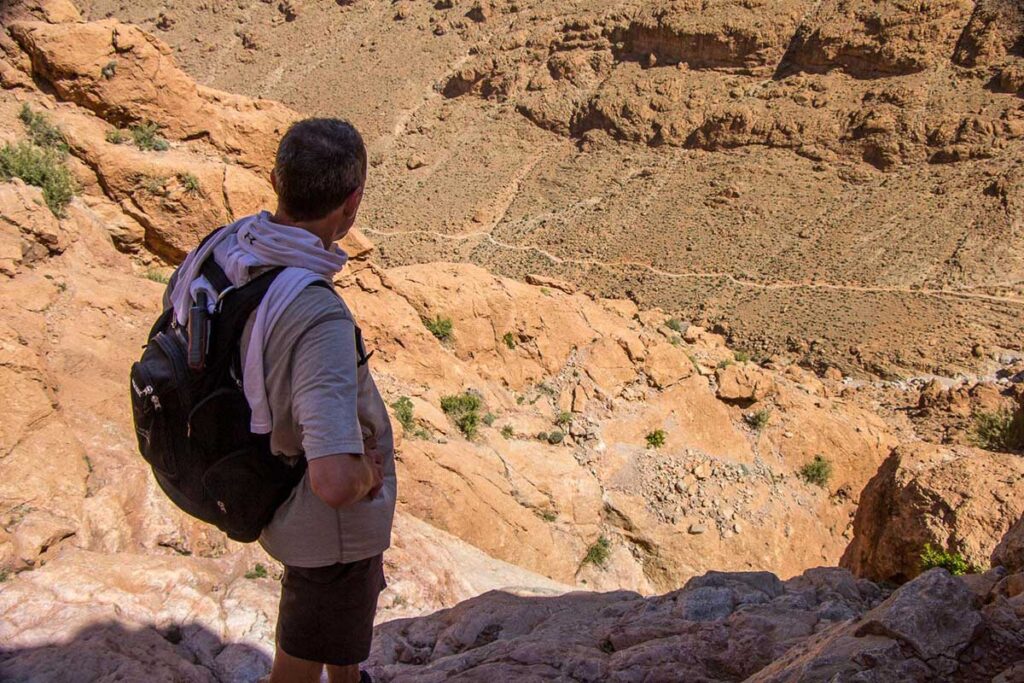
Hiking Trails and Itineraries
Whether you’re an experienced trekker or a casual stroller, Todgha Gorges has trails suited for all levels. Here’s a brief guide:
| Level | Trail Name | Duration | Highlights |
| Beginner | Gorge Floor Trail | 1-2 hours | Flat, scenic river walk |
| Intermediate | Tinghir Loop | 4-5 hours | Village views, palm groves |
| Advanced | High Atlas Climb | 7-8 hours | Mountain vistas, remote terrain |
Tips: Always carry water, sun protection, and wear appropriate footwear.
Rock Climbing in Todgha Gorges
Why It’s a World-Famous Climbing Spot
Todgha Gorges attracts climbers from around the globe for its vertical walls, ideal limestone conditions, and a range of routes from beginner to expert.
Best Climbing Routes and Gear Rental
Popular routes include “Etoile des Gorges” and “Le Rappel”. You can rent gear or hire guides in Tinghir or local climbing shops.
Tips for Beginners and Pros
Hire a certified guide if you’re new. Always check weather conditions and let someone know your route before climbing.
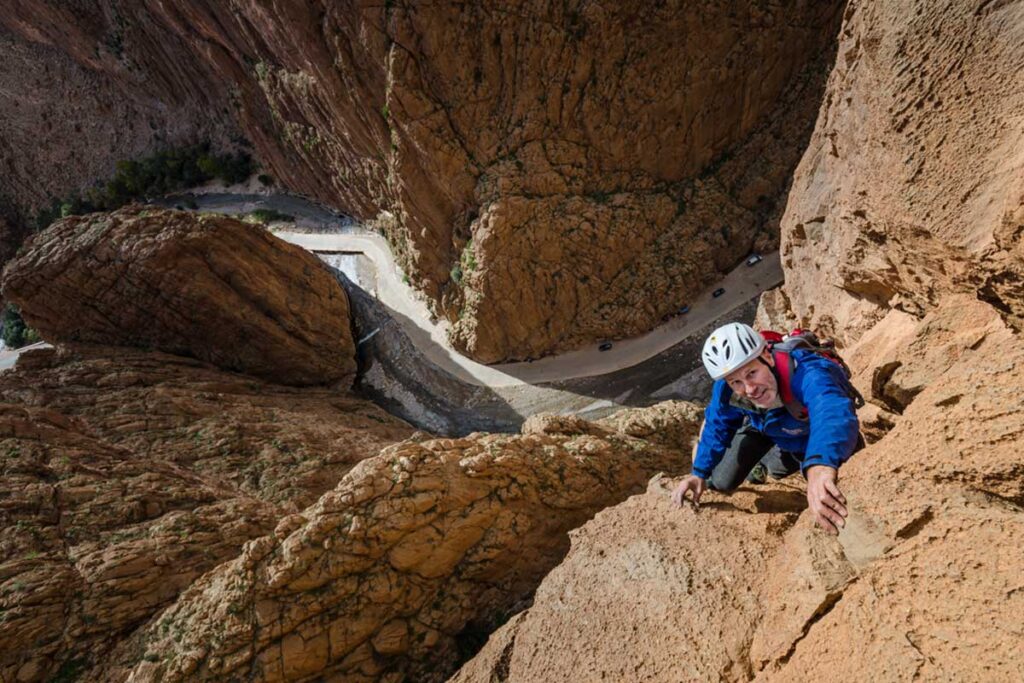
Where to Stay Near Todgha Gorges
Riads, Guesthouses, and Eco-Lodges
Accommodations near Todgha Gorges range from traditional Berber guesthouses to modern eco-lodges. Many are family-run and offer a personal, authentic experience. You can find charming riads and rustic inns nestled along the Todgha River, often with rooftop terraces offering spectacular canyon views.
Budget to Luxury Accommodation Options
- Budget: Hostels and small auberges offer clean, comfortable rooms with shared bathrooms, ideal for backpackers.
- Mid-range: Guesthouses and riads with private rooms, hot showers, and optional meals provide excellent value.
- Luxury: Boutique hotels and eco-lodges blend comfort with sustainability, offering high-end amenities and guided tours.
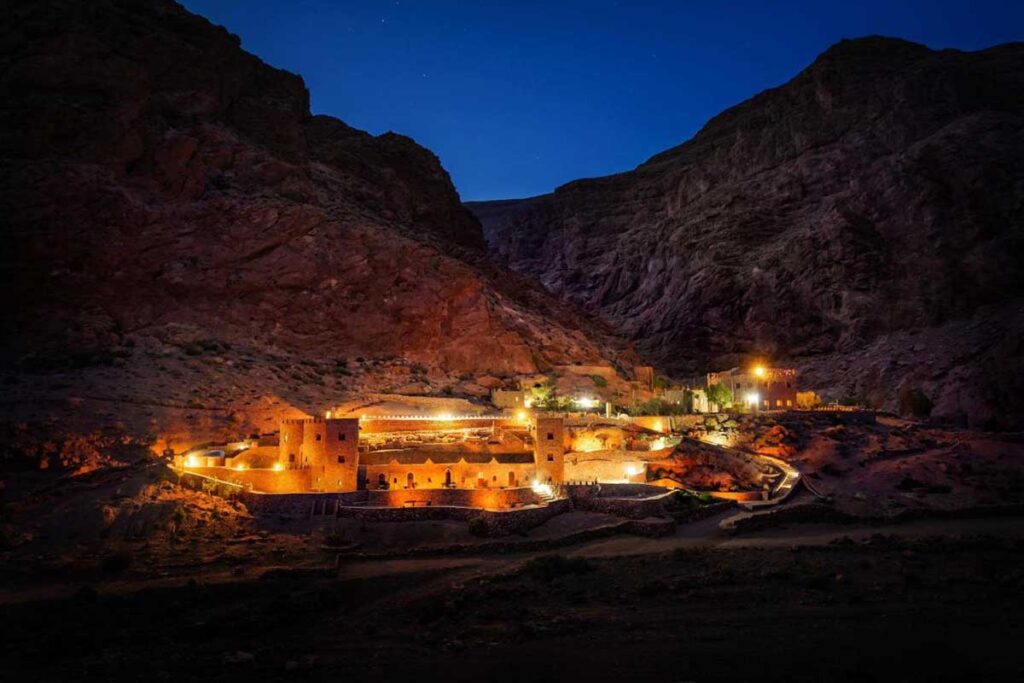
Where to Eat and Drink
Traditional Berber Cuisine
Local eateries serve delicious Moroccan dishes such as tagines, couscous, and pastilla, often made with fresh, organic ingredients. Try the lamb tagine with apricots or a hearty vegetable couscous for an authentic taste of the region.
Best Local Restaurants and Cafes
Many guesthouses serve homemade meals, but nearby Tinghir also offers restaurants with a broader selection. Popular spots include Restaurant Etoile des Gorges and Chez Michèle, where you can enjoy traditional food with a view.
Photography Tips for Todgha Gorges
Best Times of Day for Shooting
Early morning and late afternoon provide the best lighting, casting golden hues over the canyon walls. These times also offer softer shadows and fewer tourists.
Top Spots for Panoramic Views
- The entrance of the gorge for a dramatic perspective.
- The footbridge crossing the river.
- The higher trail viewpoints, offering a wide-angle view of the canyon and valley below.
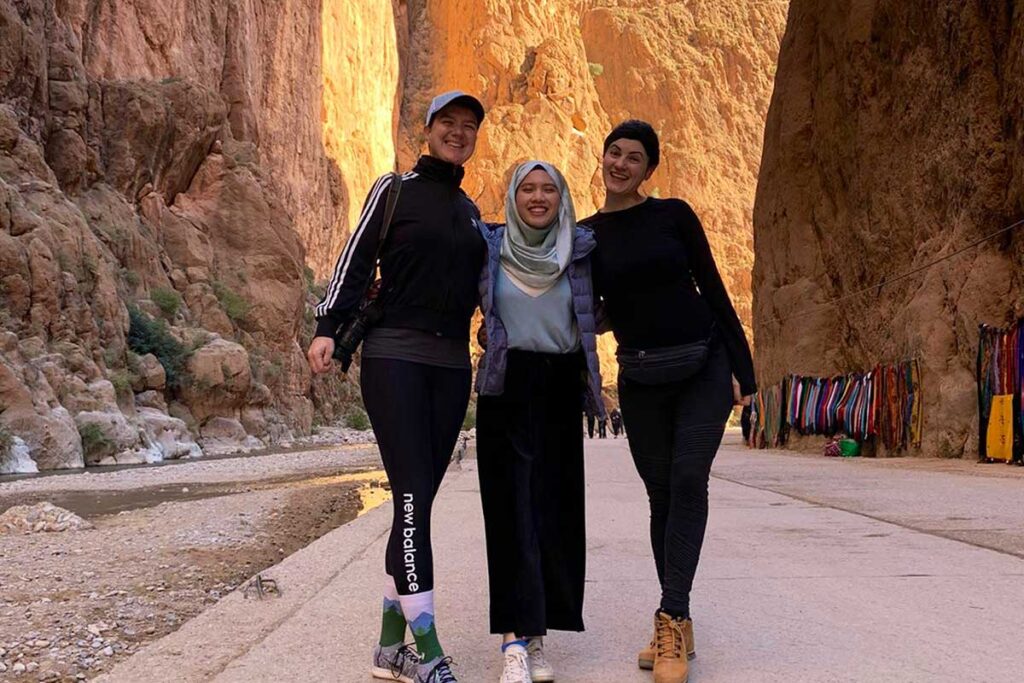
Safety Tips and Travel Essentials
What to Pack and Wear
- Essentials: Sunscreen, sunglasses, reusable water bottle, sturdy hiking boots.
- Clothing: Light, breathable fabrics for the day and warm layers for chilly nights.
- Other: A basic first-aid kit and a flashlight for early or late treks.
Read more about what to pack for a Sahara Desert Tour in Morocco
Staying Safe While Exploring
Stick to marked trails and avoid climbing without proper gear or experience. Flash floods can occur in the rainy season—always check weather forecasts and consult locals.
Health and Emergency Services Nearby
Tinghir has pharmacies and a hospital for basic medical needs. For serious emergencies, the nearest major medical centers are in Ouarzazate or Errachidia.
Day Trips and Nearby Attractions
Dades Valley
Just an hour’s drive away, the Dades Gorges offer winding roads, striking rock formations, and picturesque Kasbahs. It’s a favorite for road-trippers and photographers.
Desert Excursions from Tinghir
You can arrange a private desert trip to Merzouga and the Erg Chebbi dunes. Camel rides, sandboarding, and camping under the stars await.
Exploring Nearby Oases and Kasbahs
Visit the lush Todgha Palm Grove or explore ancient Kasbahs like Ksar El Khorbat to experience life as it was centuries ago.
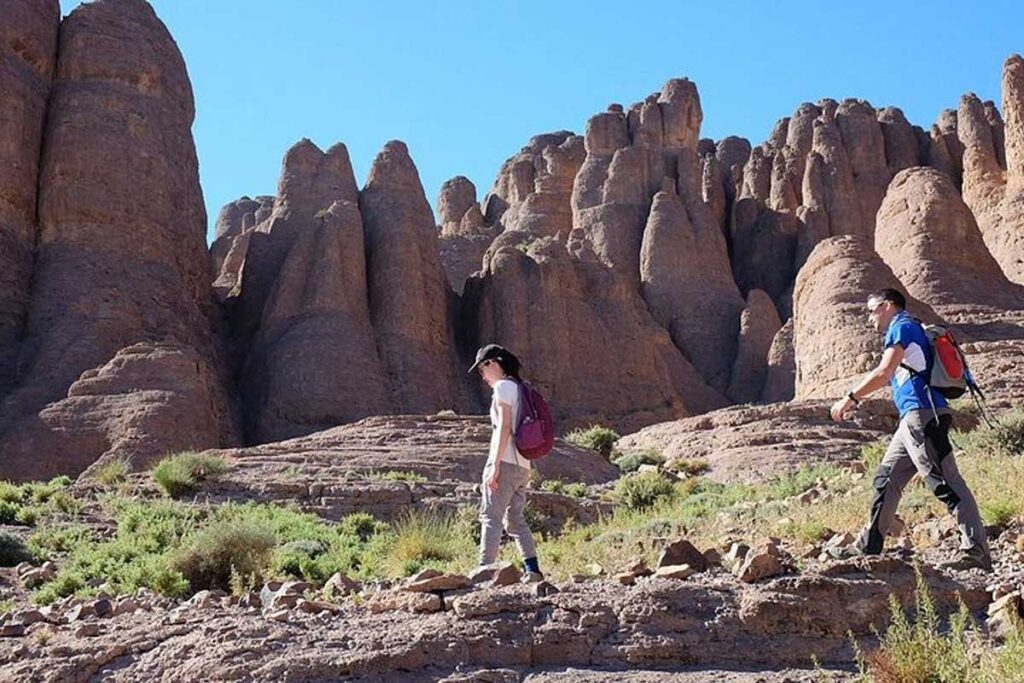
Budgeting Your Trip
| Category | Estimated Cost (Per Day) |
| Accommodation | $20 – $100 |
| Food | $10 – $30 |
| Transport | $5 – $50 |
| Activities | $0 – $50 |
| Total Daily Budget | $35 – $230 |
Money-saving Tips:
- Travel during shoulder seasons.
- Share rides or use public transport.
- Choose local guesthouses over big hotels.
FAQs About Todgha Gorges
Yes, it’s generally safe. Just follow local advice and take standard travel precautions.
2-3 days is ideal to explore the gorge, hike, and experience local culture.
While not deep enough for swimming, you can wade and cool off in spring or early summer.
Yes, local guides offer half-day to full-day tours tailored to your experience level.
Absolutely. Easy trails and cultural activities make it family-friendly.
The closest airports are in Ouarzazate and Errachidia, both offering regional flights.
Conclusion: Why Todgha Gorges Should Be on Your Bucket List?
Todgha Gorges isn’t just a destination—it’s a transformative experience. The towering cliffs, rich Berber culture, thrilling hikes, and serene beauty create a mosaic of adventure and peace. Whether you’re scaling a limestone wall, sipping mint tea under the stars, or wandering through palm-filled valleys, Todgha Gorges will leave you with memories etched as deeply as the canyon itself.
So pack your bags, embrace the unknown, and let Todgha Gorges guide your next journey of discovery.


